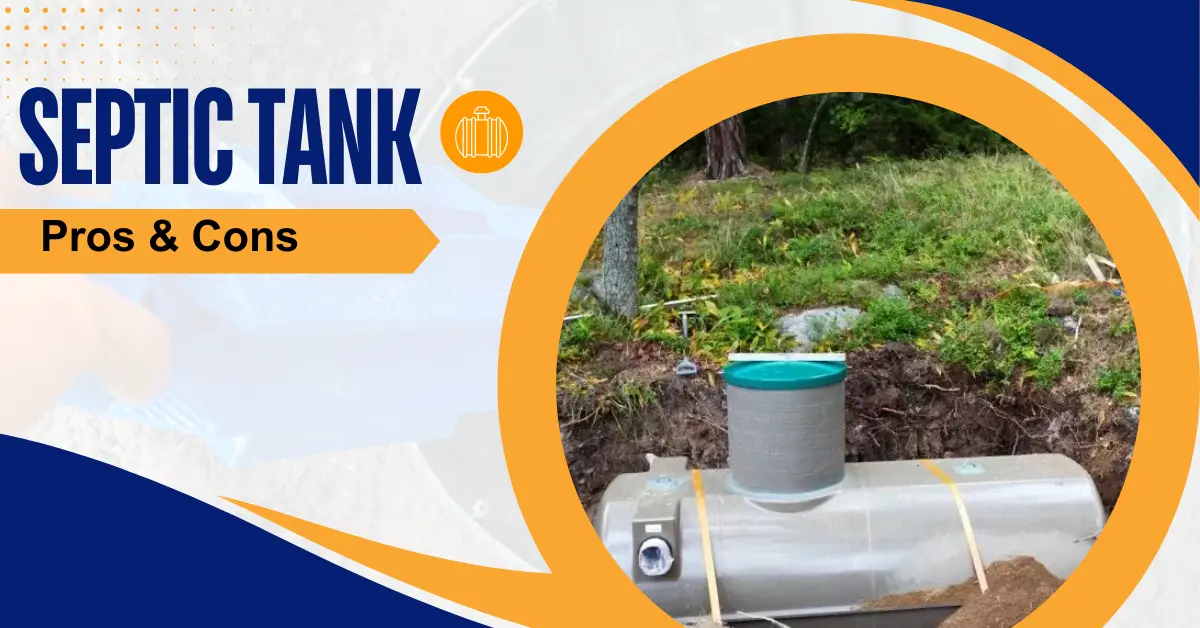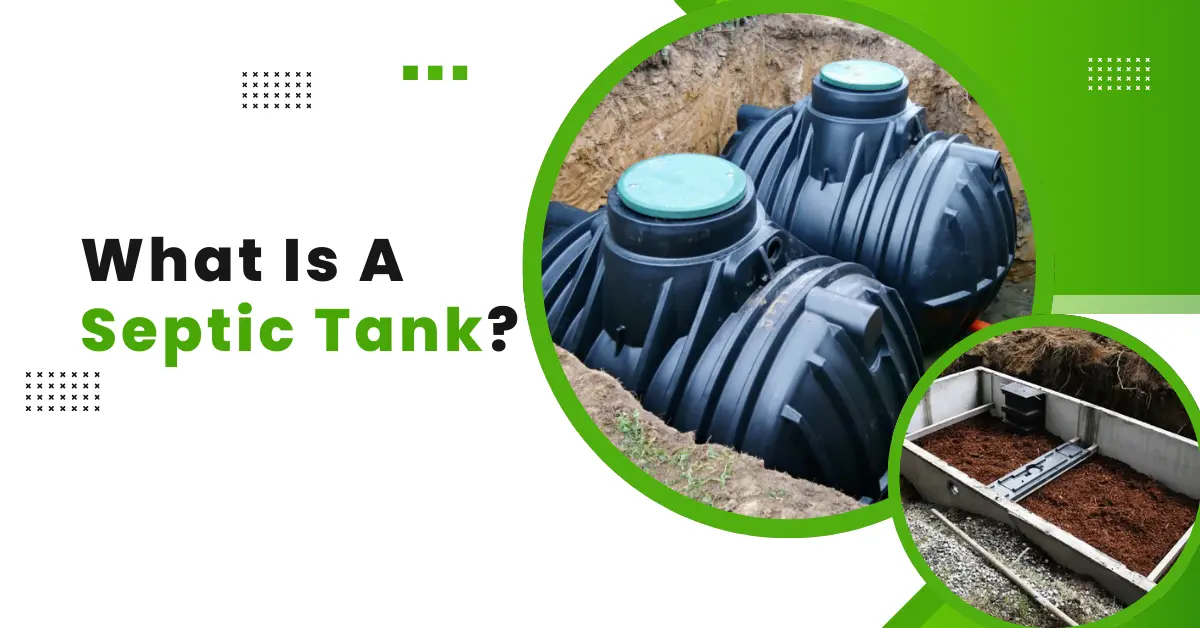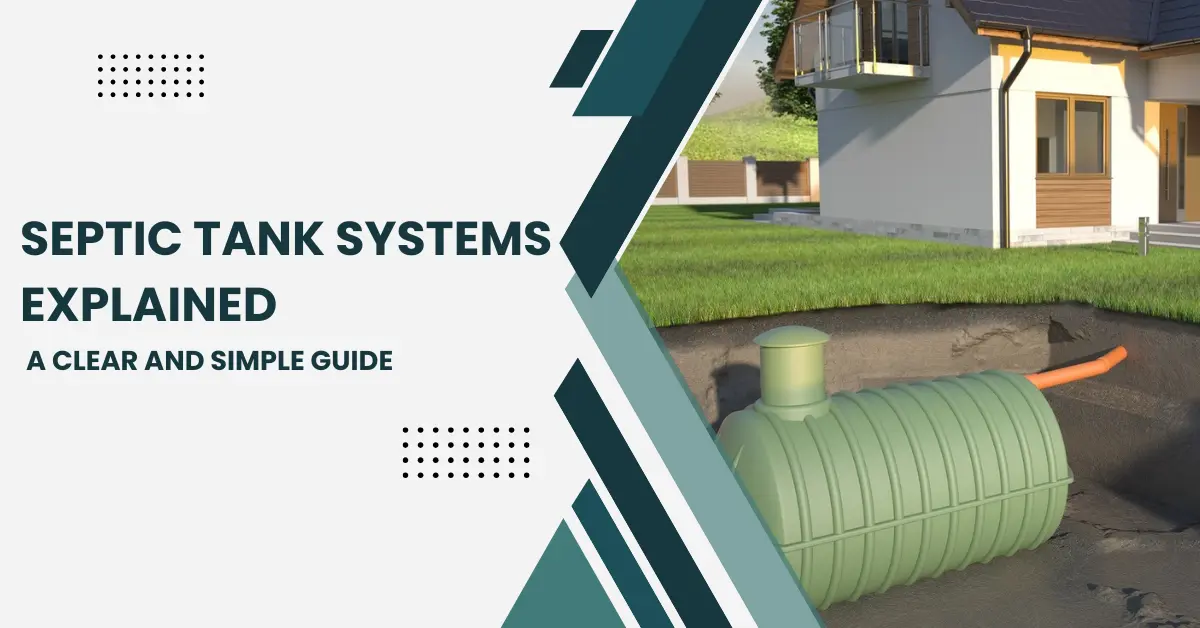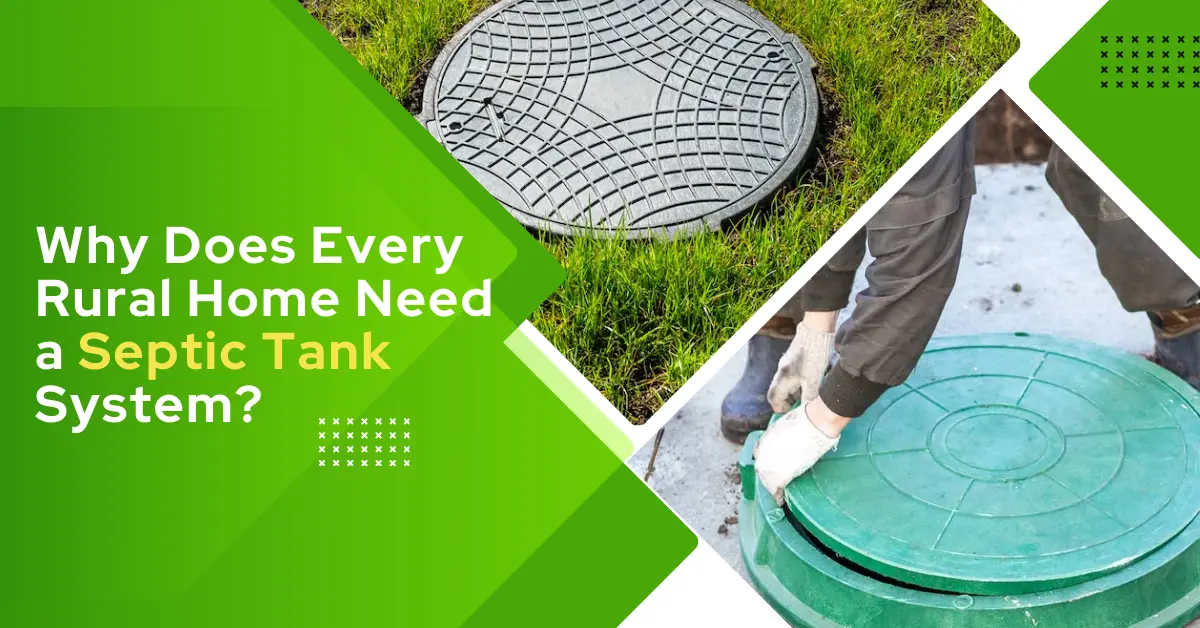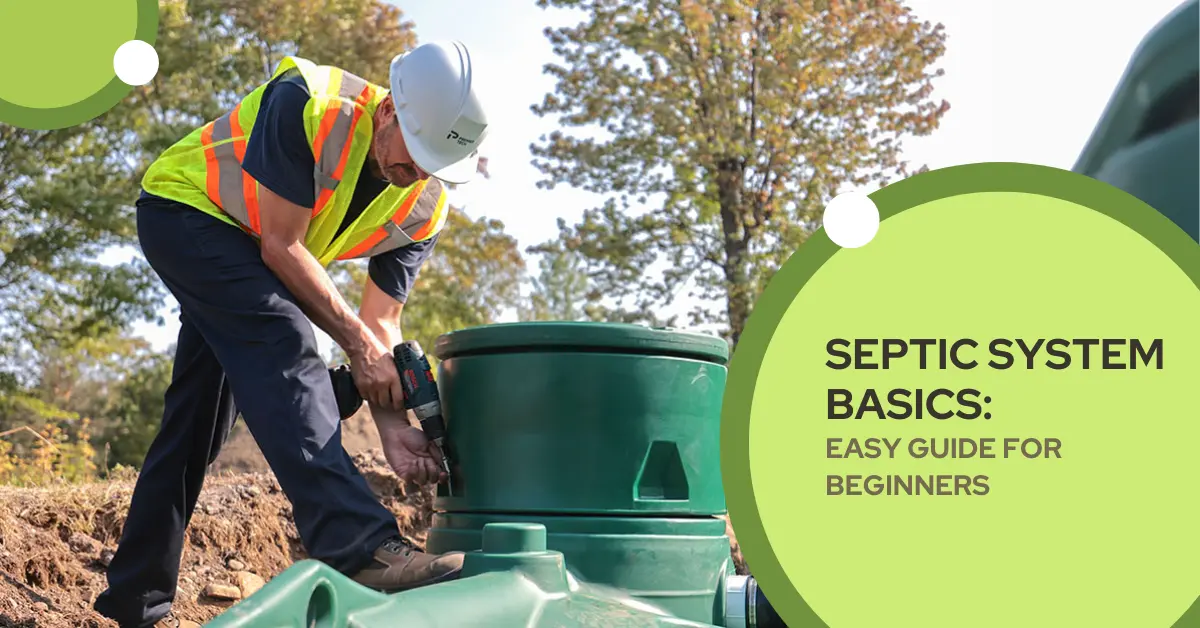If you live in the countryside or plan to build a home where there’s no city sewer line, you’ve probably thought about using a septic tank. It can give you more control over your waste system and help you save money in the long run. But it’s not always simple.
You must know the pros and cons of a septic tank before making a purchase. Some people love the freedom they offer. Others find the upkeep a bit too much. Before you make a decision, it’s important to understand how these systems work and what they really require.
In this guide, you’ll learn the ups and downs of owning a septic tank, how it compares to a regular sewer system, and which type of tank might work best for your home. Let’s get into it.
What Is a Septic Tank and How Does It Work?
A septic system is a private, underground wastewater treatment system designed for homes that aren’t connected to municipal sewer lines. It consists of a septic tank, a drain field (also called a leach field), and a system of pipes.
When wastewater flows out of your home, it enters the septic tank where it separates into three layers: solid sludge at the bottom, liquid effluent in the middle, and scum on top. The liquid moves on to the drain field, where it is naturally filtered through soil. Some systems operate anaerobically (without oxygen), while others use aerobic processes to treat waste more efficiently.
Now that you know how septic systems work, let’s look at the key pros and cons.
Pros of a Septic Tank
Let’s explore the advantages of a septic tank:
1. Saves Money Over Time
One of the biggest advantages of a septic system is that it eliminates monthly sewer bills. Once installed, you won’t pay fees to a city utility, and you’re not subject to rate hikes. Over time, this independence from public infrastructure can lead to significant savings.
2. Low Installation Costs (In Some Cases)
For rural or undeveloped areas, installing a septic system can be much cheaper than connecting to an existing sewer line. Extending municipal sewer infrastructure can cost tens of thousands, while a standard septic system usually runs between $3,000 and $7,000.
3. Environmentally Friendly (When Maintained Properly)
A well-maintained septic system is eco-friendly. Modern systems, like aerobic or bio septic tanks, treat waste efficiently and return clean water to the soil. These systems minimize pollution and protect local ecosystems, provided regular maintenance is performed.
4. Independence from Municipal Systems
Septic tanks offer self-reliance, making them ideal for remote homes or off-grid living. You won’t be affected by city sewer outages or infrastructure issues, and you’re in full control of your system.
Cons of a Septic Tank
These are the disadvantages of a septic tank:
1. Requires Regular Maintenance
Septic systems need periodic pumping (every 3 to 5 years), routine inspections, and occasional repairs. Skipping maintenance can result in foul odors, clogs, or even sewage backups into the home.
2. Risk of Groundwater Contamination
If a septic tank is installed too close to a water source or not maintained properly, it can leak contaminants into the groundwater. This is especially dangerous near wells or in areas with high water tables.
3. Costly Repairs and Failures
When something goes wrong, it’s usually expensive. Clogs, backups, or failed drain fields can cost thousands to fix. And unlike municipal systems, you’re responsible for all repair costs.
4. Not Ideal for All Soil Types
Septic tanks require soil that drains well. Clay-heavy, rocky, or shallow soil can prevent proper drainage and lead to system failure. In such cases, alternative or more expensive systems may be needed.
Pros and Cons of a Septic Tank
Not all septic tanks are created equal. Depending on your property type, budget, and environmental concerns, different tank materials and systems offer varying advantages and limitations. Below is a breakdown of the most common types of septic tanks and what you need to know before choosing one.
Concrete Septic Tanks
Concrete septic tanks are one of the oldest and most commonly used systems in residential properties. They’re built to last and offer solid performance in most soil types.
Pros
- Extremely durable, often lasting 30 to 40 years or more when properly maintained.
- Less likely to float or shift in the ground due to their heavy weight.
- Resistant to damage from regular usage and earth movement.
Cons
- Over time, concrete can crack, especially if exposed to acidic wastewater or tree roots.
- Heavyweight makes transportation and installation more challenging and expensive.
- Repairs can be difficult if the tank cracks underground.
Concrete tanks are a reliable choice for homeowners who want a long-term, sturdy solution and don’t mind the higher upfront costs or heavier installation process.
Plastic Septic Tanks
Also known as polyethylene tanks, plastic septic systems have gained popularity due to their lightweight and resistance to corrosion.
Pros
- Much lighter than concrete, which means they’re easier and cheaper to transport and install.
- Won’t rust or corrode, even in areas with acidic groundwater.
- Smooth interiors reduce the risk of waste buildup.
Cons
- Can shift or float if not properly anchored, especially in areas with high water tables or frequent flooding.
- Less durable than concrete, can warp or crack under pressure.
- May require more frequent inspections to ensure stability.
Plastic tanks are ideal for properties with good soil drainage and where budget or ease of installation is a primary concern.
Bio Septic Tanks
Bio septic tanks are newer, eco-friendly alternatives to traditional systems. They rely on bacteria to break down waste more efficiently and are often used in sustainable or green home projects.
Pros
- Highly eco-friendly, reducing pollution and reusing water for irrigation or other gray water applications.
- Produces minimal odor compared to traditional systems.
- Requires less frequent pumping due to higher treatment efficiency.
Cons
- Higher upfront costs, often significantly more than standard tanks.
- Limited availability and fewer contractors familiar with installation and maintenance.
- May require electricity or specific environmental conditions to function optimally.
Bio septic tanks are an excellent choice for environmentally conscious homeowners or those building green-certified properties. They’re especially useful in areas where water conservation is a priority.
Lagoon Septic Systems
Lagoon systems are different from traditional septic tanks. Instead of burying a tank underground, a lagoon system uses a large, open pond to treat and evaporate wastewater.
Pros
- Well-suited for large, rural properties with plenty of open land.
- Less mechanical maintenance, most treatment happens naturally through sunlight and microbial activity.
- Can handle large volumes of wastewater compared to traditional tanks.
Cons
- Require a significant amount of land, making them unsuitable for residential areas with limited space.
- Tend to produce strong odors, especially in warmer months.
- Subject to local regulations and zoning restrictions that can limit or prohibit their use.
Lagoon systems are typically reserved for agricultural settings or large properties where other systems aren’t feasible. While effective, they’re not ideal for standard residential neighborhoods due to their space and smell requirements.
Septic Tank vs Sewer System: Which One’s Better?
Choosing between a septic tank and a municipal sewer system depends on where you live, your budget, and how much maintenance you’re willing to handle. Let’s break it down briefly:
Cost Comparison
In urban settings, sewer systems are cheaper because the infrastructure already exists. But in rural areas, installing a septic tank is usually more affordable upfront and avoids ongoing sewer fees.
Maintenance Comparison
Sewer systems require little to no personal upkeep—the city handles it all. Septic tanks, on the other hand, require consistent pumping, inspections, and repair responsibility lies solely with the homeowner.
Environmental Impact
Septic systems can be more sustainable, especially in low-density areas. However, they can also cause serious pollution if neglected. Sewer systems can also overflow or leak in extreme weather, but maintenance is handled professionally.
Convenience
Sewer systems are hands-off and hassle-free. Septic systems require a bit more attention and careful usage, especially when it comes to flushing or water use.
Are Septic Tanks Bad for the Environment?
Not inherently. In fact, well-maintained septic systems can support sustainable water management by returning filtered water to the environment. Aerobic and bio septic tanks offer even cleaner processing, reducing your environmental footprint.
The problems arise when systems are neglected. Poor maintenance can lead to groundwater pollution, environmental damage, and health hazards. The key to keeping your septic system eco-friendly is responsible ownership and regular servicing.
Final Verdict
So, should you go with a septic tank? That really depends on your lifestyle, your property, and how much responsibility you’re willing to take on. If you don’t mind regular maintenance and want to avoid monthly sewer bills, a septic system could be a solid, long-term option.
But it’s not for everyone. Some properties aren’t suited for it, and not everyone wants to deal with the upkeep.
Take a good look at your land, your budget, and how involved you want to be. If the setup fits, a septic tank can give you reliable performance and peace of mind for years to come.
FAQs
What are the main pros of having a septic tank?
The primary advantages include independence from municipal sewer systems, lower long-term costs, and environmentally friendly waste treatment. Septic tanks are especially beneficial for rural or off-grid properties, offering a self-sufficient and sustainable solutions.
What are the biggest drawbacks of septic tanks?
Major cons include high installation costs, ongoing maintenance needs, and the risk of system failures if not properly maintained. Septic tanks are also sensitive to improper usage, such as flushing non-biodegradable items.
Is a septic tank better than being connected to a city sewer?
It depends on your location and lifestyle. Septic systems offer more independence and can be cheaper in the long run, but city sewer systems are often more convenient and require less personal maintenance. Urban properties typically benefit more from city sewer connections.
How often should a septic tank be pumped?
Septic tanks should generally be pumped every 3 to 5 years, depending on household size and water usage. Regular pumping prevents clogs, backups, and costly system damage.
Can septic tanks affect property value?
Yes, septic systems can either increase or decrease property value. In rural areas, a well-maintained septic system is a plus. However, in urban areas, buyers may view it as a drawback due to maintenance responsibilities and limited space.

